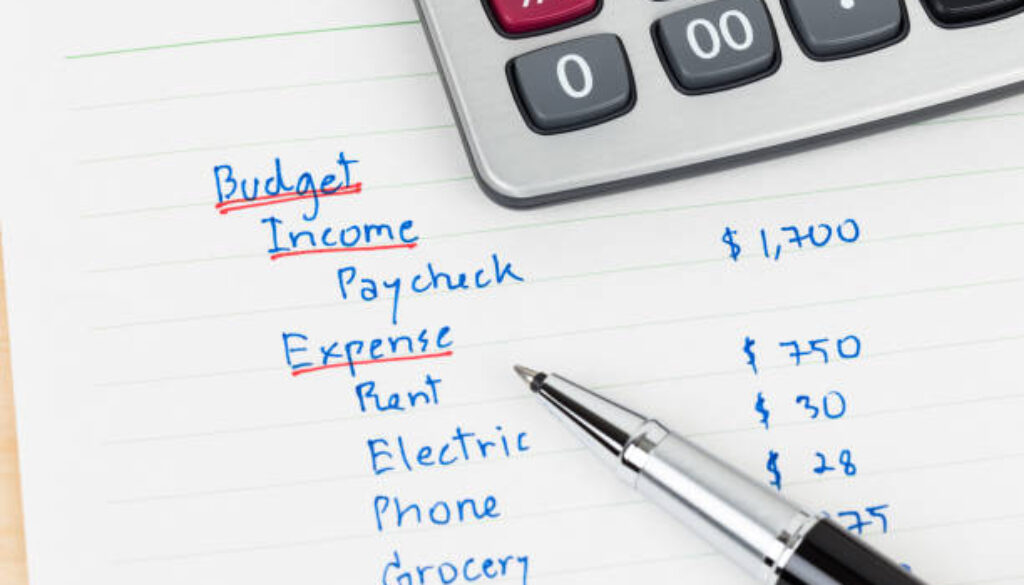Managing Your Finances Wisely
Menanteau Serfontein – 8 October 2021
We have a duty to be wise, faithful and responsible stewards of our money and possessions, irrespective of the quantum involved.
It is acknowledged that people’s financial realities differ widely and depending on circumstances, a variety of different approaches and solutions might be required.
The purpose of this Article is to outline time-tested general principles and guidelines about managing your finances wisely and responsibly.
General Principles and Guidelines for Managing Your Finances Wisely and Responsibly
1. Know at all times exactly what your income is from each of your sources of income, e.g. salary, profit, interest, dividends, etc. Also know at all times precisely what you are spending your money on and how much you spend on every item. This is the first and most important principle of managing your finances wisely.
2. Whatever your income is, live within your means. Don’t spend everything that you earn and even worse, don’t spend more than you earn. If you spend everything that you earn and especially if you spend more than you earn (usually on credit), it is guaranteed to catch up with you somewhere along the line. It causes unnecessary stress, worry, anxiety and sleepless nights. It often has a significant detrimental effect on how you feel about yourself, your mental and physical health as well as your relationships with family and friends.
Another pitfall of spending everything that you earn, or spending more than you earn, is that you are never able to get ahead financially, because you are not in a position to be able to set and achieve longer-term financial goals which can only be attained through setting aside a fixed amount for investment at regular intervals, such as monthly, in a disciplined way.
3. The best way to manage your finances wisely and responsibly, is to adopt the Budgeting approach. Based on your Income, create a Monthly Budget for all your fixed expenses, such as your tithes, water, electricity, bond repayments, vehicle purchase repayments, insurance premiums, medical, cellphone, charity, retirement related investments, provision for unforeseen events, investments based on your longer-term goals, WiFi, TV, security, banking costs, school fees, club fees, salary of gardener, etc.
Also create a Monthly Budget for all your variable expenses such as food, household necessities, fuel, garden related expenses, repairs and maintenance, gifts, dining out, entertainment, haircuts, parking, toll fees, sports and leisure activities, getaways, etc.
Depending on your circumstances, it may be advisable to also create an Annual Budget for expenses that are incurred once a year, such as annual holidays, annual school fees, annual club fees, etc.
4. Once you have created a Budget for your fixed as well as your variable expenses and you find that you are spending everything that you earn, or that your expenses exceed your income, then corrective action has to be taken immediately. You either have to find a way to earn more money, or you have to lower your expenses.
Below are a few practical guidelines and tips how to trim your expenses to enable you to end up with a fixed and variable expenses budget that is below your income so that you have a sufficient surplus to invest for the longer term:
4.1 Ruthlessly assess each and every item of expenditure (fixed as well as variable) and ask yourself “is this item something that is truly needed, or is it a nice-to-have”? If it is a “nice-to-have”, remove it from your budget. If it is something that is truly needed, perhaps you are buying too much of it, in which event you should reduce the budget for the item concerned.
4.2 Avoid incurring debt – rather save enough to be able to pay cash.
Deuteronomy 28:43-44 “43 The sojourner who is among you shall rise higher and higher above you, and you shall come down lower and lower. 44He shall lend to you, and you shall not lend to him. He shall be the head, and you shall be the tail.”
4.3 In my opinion, based on personal experience and observation of the lives of others, there are only two items that one might consider acquiring through borrowing money. The one is buying a property and the other is perhaps buying a vehicle, subject to some important principles.
In the case of a property, the ideal is to postpone buying it until you can put down a cash deposit of at least 25% of the purchase price. Ensure that the bond repayment is easily affordable within the constraints of your overall budget and that your bond repayment amount has a sufficient “margin of safety” to cater for unforeseen events, for example if there is an increase in interest rates.
Do your utmost to pay off your bond as fast as possible, because by doing so, you will enjoy huge savings in interest payments and once the bond is paid off, you will then have spare cash to invest in other asset classes for the longer term.
In the case of buying a vehicle, one has to be even more circumspect about the purchase price and your loan repayment. You must remember that buying a vehicle is NEVER a good investment. If you buy a house, there is a good chance of the value of the house increasing over time, however from the minute that you become the owner of a vehicle, the value of the vehicle immediately starts reducing in value every day, which means that you are constantly “losing” money through the continuous depreciation of the value of the vehicle.
When you decide which vehicle to buy, it is particularly important to ensure that you don’t buy a vehicle that you cannot easily afford. Unless you can comfortably afford a given vehicle without compromising your longer-term investment goals, you should rather buy a cheaper vehicle.
Buying a vehicle that you cannot easily afford, is one of the most classical examples of making a poor financial choice. Also bear in mind that the more expensive the vehicle is, the higher your vehicle insurance premiums will be.
Don’t choose a vehicle for the wrong reasons, e.g. to “keep up with the Joneses”, i.e. “because my friend has bought a particular vehicle, I do not want to be ‘shown up’ and therefore I want to buy the same type of vehicle to prove that I can also ‘afford’ buying one”.
I am aware of some instances where people live in modest accommodation, but driving a luxury vehicle to give the impression that “I have arrived”. This is a common pitfall/trap that many people fall into. The sad reality is that most people don’t know you, they don’t even notice and they don’t care.
My strong advice is to avoid comparing yourself or competing with others – rather do what makes the best sense to you and your family from a strictly financial point of view, irrespective of what others are doing or what they might think.
Rather be content with what you have and what you can afford. The Golden Rule is “Live within your means”.
4.4 Don’t invest in “get rich quickly” schemes, such as Ponzi type schemes. If the promised return is too good to be true, then stay away from it.
The reality is that building a sound and sustainable investment portfolio invariably takes a lifetime to attain (unless you are one of the fortunate few who inherit a fortune).
“Dishonest money dwindles away, but whoever gathers money little by little makes it grow.” – Proverbs 13:11
4.5 Gradually accumulating wealth requires a large amount of self-discipline and self-restraint, coupled with delayed gratification. I promise you that there are no shortcuts. (Also Read the Articles on the site entitled “Self-Control and Self-Restraint” and “Sacrifice Today for Something Better Tomorrow – Delayed Gratification”)
“The wise store up choice food and olive oil, but fools gulp theirs down.” – Proverbs 21:20
“The plans of the diligent lead to profit as surely as haste leads to poverty.” – Proverbs 21:5
5. You may have to make tough and brave decisions in some instances, e.g. if you realise that you have made a wrong/inappropriate financial decision such as buying a vehicle that was too expensive, then the best option is to bury your pride, sell the vehicle and buy a much cheaper one. When you do so, you will be lifting a huge burden from your shoulders.
6. Before you go shopping, make a list of what you need and have to buy and stick to the list. Don’t fall for impulse buying, or buying something that is not on your list, which happens to be ‘on special’.
7. Know your prices and make the effort to buy what you need at the lowest price. Why buy something at Store A for R100 if you can buy the identical item at Store B next door for R90? You might say “I’m not prepared to make the effort to save only R10”, however the pitfall is that over time, you could end up forfeiting a discount of R10 on say 100 items at a total cost to you of R1 000.
8. Avoid things like luxury overseas holidays and extravagant parties when you have not yet set aside enough for the longer term.
Definitely “don’t fly now and pay later” – rather postpone the trip until you have saved enough to pay cash for it.
“A wise man thinks ahead; a fool doesn’t and even brags about it!” – Proverbs 13:16
9. I strongly advocate generosity, but I also believe that one should guard against going overboard and doing things in order to impress. Be generous with your gifts, but your gifts should be affordable (i.e. within your budget).
We should apply the principle of generosity throughout our lives and as our financial position gets stronger, we should become increasingly more generous.
Proverbs 11:24-25 “One gives freely, yet grows all the richer; another withholds what he should give, and only suffers want. Whoever brings blessing will be enriched, and one who waters will himself be watered.”
10. All aspects of our finances must at all times be conducted with complete integrity and honesty. (Also Read the Article on the site entitled “Integrity and Honesty”)
I have applied these principles and guidelines throughout my life which have worked well for me. I still have a Budget and keep track of all our expenses.
Ideally, one should start applying these principles and guidelines as early as possible, preferably from the time when you receive your first pay-check.
When you follow these principles and guidelines, you will be setting the right example for your children and grandchildren in respect of managing your finances and treating money and goods with respect.
It is never too late to make a fresh start. If you are currently in financial distress, it is recommended that you start applying these principles and guidelines. If you are in dire financial trouble, then you may have to seek professional help.






